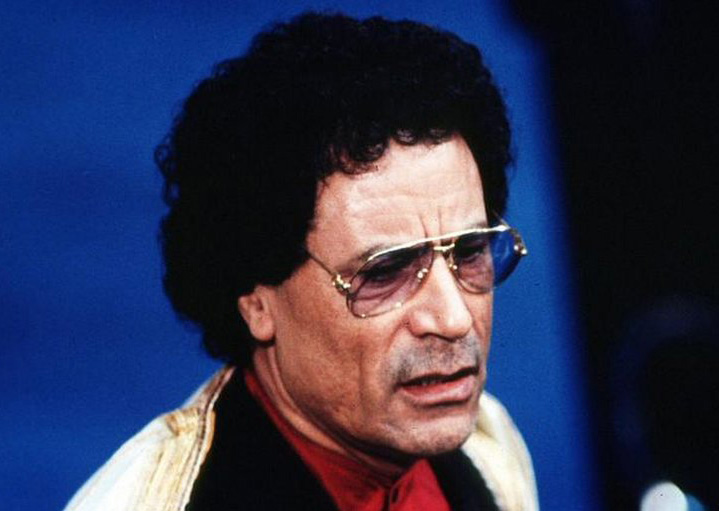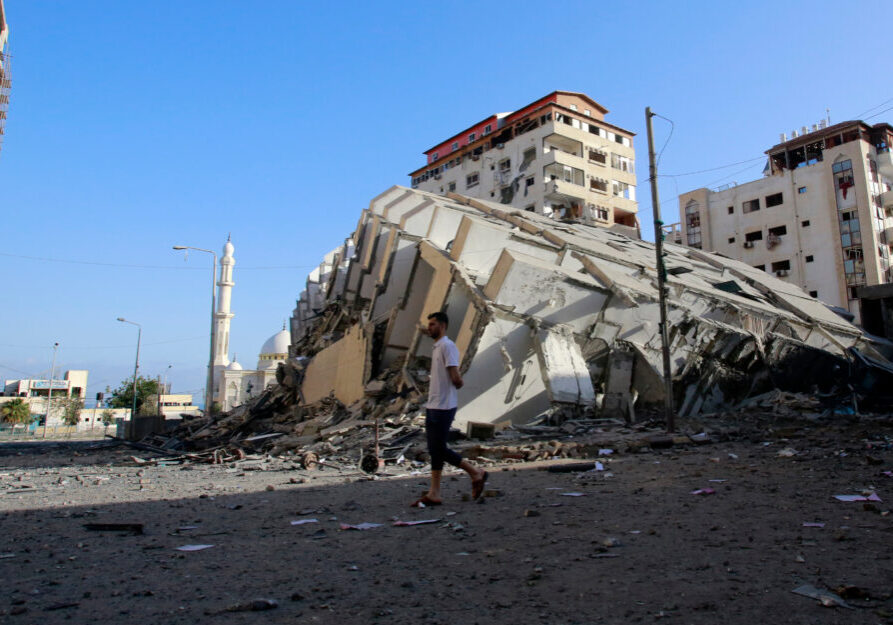Australia/Israel Review
Gaddafi’s Australian Groupies
Nov 28, 2011 | Allon Lee

Allon Lee
For those of a certain a generation, they are names from the past that cause equal measure of dread and derision.
They are the Australian cheer squad that relentlessly extolled Colonel Gaddafi’s virtues in full view of his tyrannical excesses. Australians from both the extreme left and far right were not exempt from seeking his assistance, guidance and resources and proclaiming his virtues.
Well before his death in 2011, Gaddafi was largely reduced to a comical figure, the crazy uncle of the Arab world. But in his heyday throughout the 1970s and 1980s, Gaddafi was a past master at domestic repression and a major player in terrorist training and financing of insurgencies throughout the world, including the Pacific.
With his overthrow and ultimate death on October 20 at the hands of his own people, it seems appropriate to recall some Australians who spruiked on his behalf.
It is somewhat fitting that Alex Mitchell has just published his memoirs – Come the Revolution.
A print and TV journalist in the late 1960s, Mitchell heard the siren’s song of Trotskyism and joined Gerry Healy and his Workers Revolutionary Party (WRP) in Britain.
Gallivanting around the Middle East and in Britain with Healy and the actress/activist Vanessa Redgrave, the book reads like a boy’s own adventure. It is full of picaresque vignettes in which Mitchell reminisces of days gone by cozying up to dictators like Gaddafi in the name of effecting a workers’ utopia in Britain and supporting any anti-colonialist venture so long as it was anti-Western.
With Gaddafi’s Green Book manifesto offering a patina of intellectual legitimacy, Libya was seen as a prime source of funding for Mitchell and company’s cause.
The bonhomie permeating the book, completely opaque to the suffering of victims of both Libyan terrorism and totalitarianism, belies the vicious pen that Mitchell wielded in his heyday as a propagandist editing the WRP’s daily newspaper. He exudes a starry-eyed wonderment at meeting some of last century’s most vile Middle Eastern leaders.
Given the chance to pass judgment on the likes of Gaddafi and Arafat, Mitchell describes the latter as the most impressive public figure he ever encountered, and the former as having betrayed the principles that he espoused in 1969.
But as AIJAC’s Jeremy Jones noted in AIR last February, WRP was embroiled in a scandal when it was discovered that its leadership was doing more than accepting Libyan funds – it was selling personal details of prominent Jewish Britons to Libya in exchange for funding, “with a key Australian connection courtesy of activist/journalist Alex Mitchell”. This is not discussed in the book.
In an op-ed for the Sydney Morning Herald on October 30 2011, Mitchell omitted to focus on the crimes of Gaddafi et al, instead expressing satisfaction that the impact of the Global Financial Crisis had strengthened the certainty of his anti-capitalist beliefs.
The late Claudia Wright, or “Claws” as she was affectionately and derisively known, was a prominent radio personality and controversial journalist in Melbourne in the 1970s, who also fell for Gaddafi.
Wright liked to portray herself as a fearless slayer of myths and lies but it’s a pity she couldn’t separate fact from fiction.
Thirty years before Wikileaks, Wright was accused of naming in the New Statesman magazine four Western intelligence agents she implied were working against Libya. She then subsequently denied ever having done so when interviewed on the controversy.
With a crude turn of phrase, it was a surprise to many when she started being published in such reputable journals as Foreign Affairs, with some suggestion her pieces were ghosted.
In a piece that would probably have been written today were Wright still alive, a 1981 New York Times op-ed suggests that the US might rue what follows Gaddafi’s downfall.
The hard man of the Victorian Labor Party’s left, “Baghdad” Bill Hartley led many a sensible person towards a shimmering mirage, while he lounged in an oasis of self-righteous twaddle.
An activist on behalf of Middle Eastern nationalist causes with a socialist hue, Hartley most famously acted as go-between for an impoverished ALP following the Whitlam Government’s sacking in 1975 – seeking a $500,000 loan from Iraq’s ruling Ba’ath party.
He was the Australian representative of the Iraqi News Agency and secretary of the Libyan-Australian Friendship Association from 1982 to 1986.
During the 1980s, he had an office in the Food Preservers Union North Melbourne headquarters and enjoyed shilling for Libya and Iraq on Melbourne community radio station 3CR.
He dismissed the shooting death in April 1984 of English policewoman Yvonne Fletcher outside the Libyan embassy in London by diplomats inside the building as “not the end of the world”.
In his capacity as secretary of the Libyan-Australian Friendship Association Hartley took to the media to slam the Reagan Administration’s March 1986 failed assassination attempt against Gaddafi. Hartley claimed in the Melbourne Herald there was no proof that Libya was responsible for the bomb that killed US servicemen in a Berlin nightclub 10 days before the assassination attempt.
Hartley opined that “Muammar Gaddafi stands as a hero far beyond the confines of the Arab world – as well as reinforcing the domestic credit which has stood him in good stead as the continuing leader of the Libyan revolution since September 1, 1969.”
In 1986, Hartley was eventually expelled from the ALP because of his constant public criticism of then PM Bob Hawke for not supporting Middle East dictators.
Hartley died peacefully in his sleep in 2006, leaving the world no opportunity to hear him lament Gaddafi’s passing.
One of Gaddafi’s biggest promoters in Australia was a candidate from out of left field, the far right (if you will pardon the pun) Lyndon LaRouche associate and white supremacist Robert Pash.
For some reason, Pash moved from neo-Nazism in the 1970s to become a Muslim convert in the early 1980s.
The conversion did not mitigate Pash’s extremist and racist views and he ingratiated himself with Gaddafi – leading to a stint as head of the Libyan/Arab Cultural Association in Melbourne.
Funding for the centre’s activities came from the al-Mathaba News Agency aka the Anti-Imperialism Centre, which was established by Gaddafi in 1982 with a virulent anti-Western and anti-Zionist agenda.
Pash was certainly a crank, but a dangerous one with access to Libyan money.
It is easy to forget now, but as Colin Rubenstein noted in a 1988 speech, Gaddafi was a prime agitator in the Pacific region, with Pash’s assistance: “In July 1986, Pash officially visited Vanuatu and issued jointly with Prime Minister Lini a pledge of support for Gaddafi ‘in his struggle against Zionist US imperialism.'”
Australia broke off relations with Libya in May 1987 in response to Gaddafi’s meddling in the Pacific, closing the Libyan People’s Bureau in Canberra.
In May 1987, Aboriginal Affairs Minister Clyde Holding took on the Libyan/Arab Cultural Association for both its far right wing links and for sponsoring a trip by indigenous separatist Michael Mansell and his colleagues in April 1987 to attend Gaddafi’s second Libyan “Conference”.
AIR recounted in 1998 that Holding told Parliament how Pash advocated the “biological integrity of the white race through a complete geographic and political separation of the races and thus the maintenance of international white unity.”
Holding described Pash as an “anti-Semitic right wing racist political loony in the tradition of Goebbels and Hitler,” and then tabled Queensland Police reports which showed that Pash had been under investigation following death threats to Queensland’s Jewish community by an organisation, The Sword of Islam, for which Pash was the spokesman.
Mansell’s visit caused controversy in Australia over his push for an independent Aboriginal Provisional Government backed by Libya.
In February 2011, Mansell admitted to the Australian newspaper journalist Melinda Rout that there is “nothing to admire now” about Colonel Gaddafi’s leadership.
Mansell, however, was not alone in travelling to Libya to commune with Gaddafi. One of Pash’s many other activities included coordinating Libyan government funded delegations to Tripoli.
Peter Boyle, a left wing journalist who went on a Libyan trip acknowledged on his blog in February 2011 “With hindsight, I should [have] developed and expanded of [sic] some of my criticisms of the Gaddafi regime. But that’s the thing about hindsight – you only get it later!”
Interestingly, a self-declared “Robert Pash” added a comment at the end of Boyle’s post that hints at his continuing pride in his activities on behalf of Gaddafi: “Hey Peter, tell us about the source of funds for your trip and the travel agent you went through. Then no one will think you’re hiding anything”.
In 1989, Victorian Labor MLC Joan Coxsedge was one of a group of far left activists Pash assisted in travelling to Libya to meet Gaddafi.
A long time Gaddafi supporter, Coxsedge had attended the 1979 World Conference of Solidarity with the Arab People in Tripoli to mark a decade since Gaddafi’s coup. The conference was reportedly organised by the Central Committee of the Soviet Communist Party and the PLO.
In a letter written on October 30, 2011 just days after Gaddafi’s death, Coxsedge condemned his death and the outcome of the Libyan revolution which she attributed solely to US and Western imperialism, describing the National Transitional Council as NATO’s quisling.
According to Coxsedge, “Libya, like everywhere else, wasn’t perfect, and yet it was an example of an independent, prosperous and secular African country which used its great oil wealth for the benefit of the Libyan people, providing free education and health care and decent housing, and helping poor parts of Africa, but which has been completely destroyed in a brutal cowardly war called `humanitarian’ by Washington and its cronies.”
Other MPs who travelled with Coxsedge included Jean McLean, George Crawford, and former Nuclear Disarmament Party Federal Senator Irina Dunn.
Also interviewed by Rout for her Australian article, Dunn said she went to Libya because Gaddafi claimed he could disprove that a facility in Rabta was the chemical weapons factory it was alleged by the US to be.
But Dunn said she knew straight away that the Libyan leader had not been telling the truth. She said the whole meeting was ‘incredibly stage-managed’.
Perhaps the final word should go to Dunn’s suggestion for the probable reason some choose to disregard Gaddafi’s criminal excesses and seek a false utopia in the northern African desert:
Dunn said her parliamentary colleagues from the Left of the ALP had been too blinded by their dislike of the US throughout the trip to see what was happening in Libya.
“It just didn’t add up, but they didn’t see that. They were blinded by their ideology. They were deeply, deeply anti-American,” she said.
Tags: Australasia






